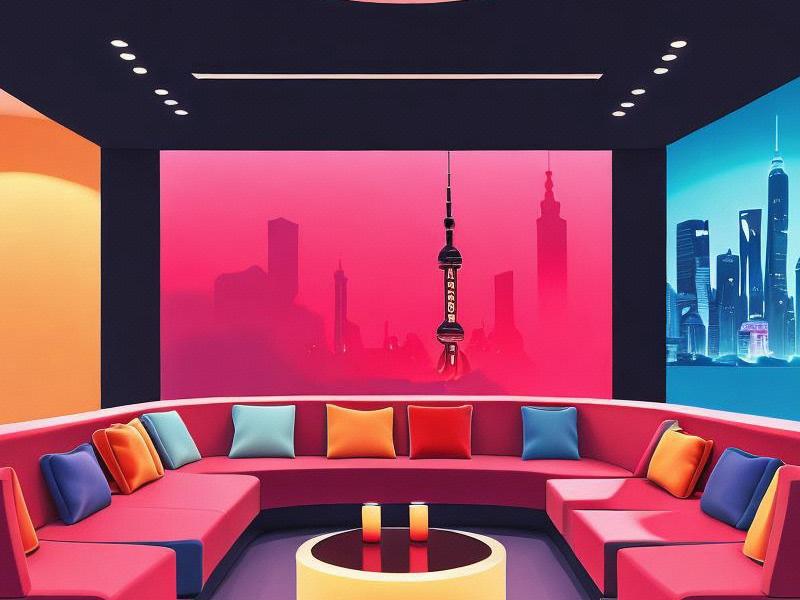
In the heart of Shanghai, where the neon lights of the Bund reflect off the Huangpu River, the city's entertainment clubs stand as vibrant hubs of nightlife. These establishments, ranging from high-end cabarets to trendy bars, have long been a staple of Shanghai's urban culture, offering a blend of glamour, music, and social interaction. However, the world of entertainment clubs is not without its complexities, as it navigates the delicate balance between providing an enjoyable experience for patrons and adhering to strict regulatory standards.
Entertainment clubs in Shanghai are more than just places to party; they are cultural landmarks that reflect the city's dynamic and cosmopolitan nature. These venues host a variety of events, from live music performances and comedy shows to art exhibitions and themed parties. They attract a diverse clientele, including locals, expatriates, and tourists, all drawn by the promise of a night out in one of the world's most exciting cities.
The history of Shanghai's entertainment clubs dates back to the early 20th century, during the city's heyday as a global metropolis. The French Concession, in particular, became known for its luxurious cabarets and dance halls, which were frequented by international celebrities and Chinese elites alike. This legacy of sophistication and opulence continues to influence the city's modern-day entertainment scene.
In recent years, Shanghai has seen a surge in the number of entertainment clubs, reflecting the growing demand for nightlife experiences among the city's burgeoning middle class. These establishments have evolved to cater to a wide range of tastes and preferences, from traditional Chinese opera performances to electronic dance music (EDM) festivals. They have also become important venues for socializing and networking, with many clubs hosting private events and business gatherings.
夜上海419论坛 However, the rapid growth of Shanghai's entertainment industry has not been without challenges. One of the most pressing issues is the need to balance the city's vibrant nightlife with public safety and order. In response to concerns about noise pollution, overcrowding, and other social issues, the Shanghai government has implemented a series of regulatory measures aimed at ensuring that entertainment clubs operate in a responsible and sustainable manner.
One of the key regulatory frameworks governing Shanghai's entertainment clubs is the "Shanghai Nightlife Management Measures," which were introduced in 2017. These measures impose strict requirements on club operators, including obtaining permits, adhering to safety standards, and maintaining cleanliness and hygiene. They also require clubs to implement measures to control noise levels and prevent overcrowding, such as setting time limits for performances and limiting the number of patrons allowed inside.
In addition to these regulations, the Shanghai government has also launched campaigns to promote a healthy and safe nightlife culture. These campaigns include public awareness campaigns about the dangers of excessive drinking and drug use, as well as initiatives to encourage responsible behavior among club-goers. The government has also worked closely with club operators to develop best practices for managing large crowds and ensuring the safety of patrons.
Despite these efforts, some critics argue that the regulatory environment for entertainment clubs in Shanghai is still too restrictive. They contend that the city's nightlife could benefit from a more relaxed approach, allowing for greater creativity and innovation in the industry. Others, however, point out that the current regulations are necessary to protect public safety and maintain the quality of life for residents.
上海私人外卖工作室联系方式 One of the most significant challenges facing Shanghai's entertainment clubs is the impact of the COVID-19 pandemic. The pandemic has had a devastating effect on the global nightlife industry, with many clubs forced to close their doors or operate at reduced capacity. In Shanghai, the government implemented strict lockdown measures and social distancing guidelines, which further disrupted the city's nightlife scene.
As the city begins to recover from the pandemic, entertainment clubs are facing an uncertain future. While some have managed to adapt by offering virtual events and outdoor gatherings, others have struggled to stay afloat. The pandemic has highlighted the vulnerability of the nightlife industry and the need for resilience and innovation in the face of adversity.
In the long term, the future of Shanghai's entertainment clubs will depend on their ability to adapt to changing circumstances and meet the evolving expectations of patrons. This includes embracing new technologies, such as virtual reality and augmented reality, to enhance the entertainment experience. It also involves fostering a sense of community and inclusivity, ensuring that nightlife remains accessible and enjoyable for people from all walks of life.
上海夜网论坛 Another important aspect of the future of Shanghai's entertainment clubs is their role in promoting cultural exchange and understanding. As a global city, Shanghai is home to a diverse population of residents and visitors from around the world. Entertainment clubs can serve as platforms for cultural exchange, bringing together people from different backgrounds to share their experiences and perspectives.
For example, some clubs have started hosting international music festivals and cultural events, showcasing the best of global talent. These events not only provide a platform for artists to showcase their work but also offer patrons the opportunity to experience different cultures and traditions. By fostering a sense of global connectedness, entertainment clubs can contribute to a more inclusive and harmonious society.
In conclusion, Shanghai's entertainment clubs are an integral part of the city's nightlife and urban culture. They offer a vibrant and dynamic environment for socializing, entertainment, and cultural exchange. However, they also face significant challenges, including regulatory requirements, public safety concerns, and the impact of the COVID-19 pandemic.
As the city continues to evolve, entertainment clubs will need to adapt to changing circumstances and meet the evolving expectations of patrons. This includes embracing new technologies, fostering a sense of community and inclusivity, and promoting cultural exchange and understanding. By doing so, they can continue to thrive as a vital part of Shanghai's nightlife scene and contribute to the city's rich and diverse cultural heritage.
